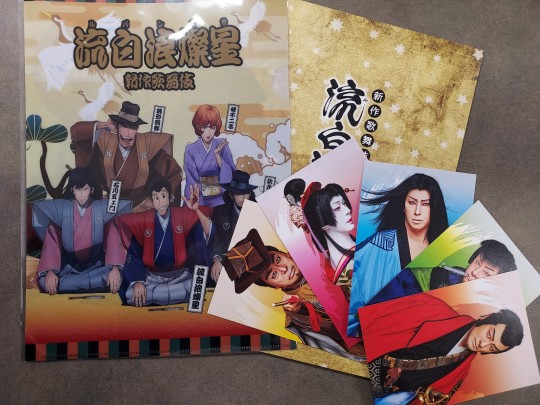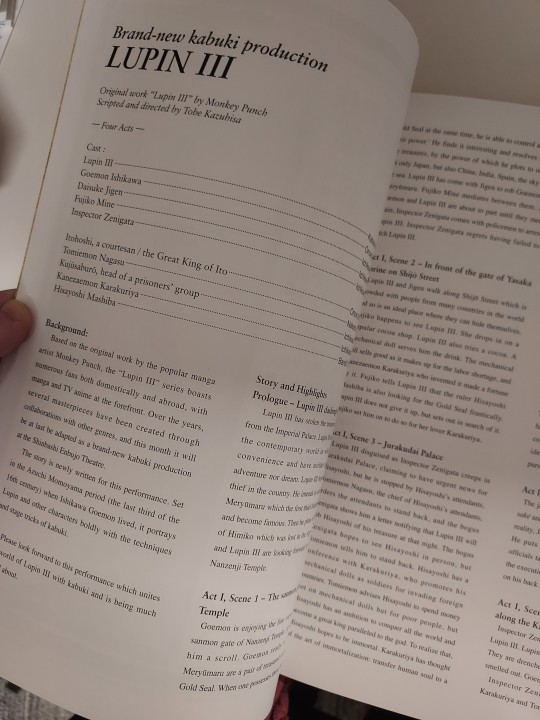#and two elementary school hiragana practice books
Text




HAVE I MENTIONNED RECENTLY THAT MY SISTER IS THE MOST AMAZING PERSON ON THE FUCKING PLANET?????? 😭💕
She went to see the new Lupin III kabuki play on my behalf, called me on the phone for an entire hour to give me a detailed report and listen to me nerd out about the anime references, and then she sent me official merch of the play for Christmas all the way from friggin' Japan. She is amazing, I do not deserve her 😭
#and she bought me an authentic ofuda from an inari shrine to add to my kamidana#and two elementary school hiragana practice books#she is the bestest fucking person on this bitch of an earth ❤️💕✨️#lupin iii#personal#aime-chan#aime
88 notes
·
View notes
Note
Hi rose I was wondering if you had any tips or suggestions on how to learn Japanese by oneself. Do you think knowing Chinese would help in learning it? It's so cool that you know more than one language I wish I could be that cool ;w;
hahaha i’m really #NotCool lol
i actually learned japanese by myself so i’m literally full of tips and suggestions haha.
addressing knowing chinese--do you mean that you’re currently learning chinese? if you’re considering learning them side-by-side i honestly don’t think that would be very helpful? the two languages developed independently of each other so they’re virtually unrelated grammatically. japanese kanji does come from china but, unless you’re talking about traditional chinese, almost all of the characters were edited to be faster to write, whereas the original versions are still used in japanese. i do think kanji is important (and fun!) to learn but you should take it slowly and don’t make it your first priority. you’re not going to want to learn a bunch of kanji right off the bat because you’re going to forget all of the ones that aren’t used in common words. i’d say learn a few every week or so? find a pace that works with you best.
if you mean that you already know chinese, there’s a handful of words which are similar and, if you can write it,you’ll be able to pick up kanji faster simply because your brain is already wired to interpret and recreate such characters. but tbh i don’t think it would be much of an advantage.
but before you even touch kanji, learn both kana systems. you can find guides fro them easily enough online. some ppl recommend not learning katakana but tbh i find that katakana is used very often. learn hiragana first going down the rows. at first i learned it five per day but i bumped up that speed after a while. keep writing them. write them whenever u have a free minute just write them over and over again and try to make their sounds as you do.
from this point.... it’s a little fuzzier? there’s a fuck ton of japanese resources out there online. not including textbooks you can buy or rent at ur local library. my suggestion is to find a resource that starts from the beginning and get going with it. no matter what website or book it is it’s not going to be perfect. keep this in mind. i remember with my first book it explained adjectives so poorly i gave up on learning japanese for months because i thought it was just too hard--but then i eventually found a different source which explained adjectives in like two sentences and it made perfect sense. so, whenever you’re using your primary reference and it confuses you, go to a secondary source and see if it explains it better. there’s so many resources out there you can find the explanation you need for any topic.
when you have a basic grasp of grammar, like ‘AはBです” levels of basic, start speaking and writing it. i have a little gaudy pink journal which contains my very first japanese journal to myself, written in glittery pink pen. for these journals don’t look up new words and don’t worry about being grammatically correct. just write. set a length requirement--maybe only four or five lines at first and then let that requirement grow larger and larger as it gets easier and easier for you to write. if you find yourself needing a word in english, like you got halfway through the sentences before suddenly realizing you don’t know the word you need, try to sound it out in katakana. believe it or not, it’s sometimes a struggle to understand english words said in japanese, so try to get yourself used to this concept. do try, however, to only use words you know and to write every day. it doesn’t matter if your journals start out like ‘my name is susan. i am seventeen. i went to school today. in the morning i ate breakfast. i had a test.’ just write.
as for talking, virtually the same rules apply. at first you’re going to have to force it, so try in the morning while you’re getting ready, or in the shower, while cooking... etc.. look up pronunciation videos online and soon you’ll find yourself not forcing out the japanese when you’re talking to yourself.
once you have a good basis in grammar, you can move on to learning more vocabulary. i, personally, used the jlpt sets on memrise, starting with n5. but, as with all sets, these aren’t perfect. memrise is, however, fucking great. use it to build sets of the vocabulary in your primary resource or vocabulary you think might be useful to you in your journals. memrise is themed around learning words being similar to taking care of plants, so it times when you should review different words. on the mobile app you can set it to alert you at a specified time to go over your words, and you can also set goals to drive you to review words or learn new words for a certain length of time every day.
personally, for the words i add to my own personal lists, i don’t worry about kanji, as the jlpt sets all have kanji. you will, however, need to learn kanji using something else. personally, i used he book remembering the kanji but it’s not perfect. as with grammar, there’s a lot of different resources so find the one that explains kanji in the way you like best.
for me i made flashcards of kanji and went over them daily. when the number became too great for that, i went over all of them once a week and put the words i got wrong into a separate pile called my ‘stress words.’ i would go over these several times a day and then, once a week, would learn a few more kanji and add those to the new ‘stress words’ for that week. i also bought a mini white board to use when writing kanji but it’s also a good idea to practice with graph paper so you can learn to keep them in the proper shape and size.
another great app i liked a lot is hellotalk. it’s virtually an instant messaging app meant to connect you with people who are native speakers of the language you want to learn. since i used it, it has also become a little bit more facebook-esque,which i think can make things a bit awkward--as you can make a post about what ur eating or whatever and a japanese person might see it and then you can use that as a way to start conversation and avoid the awkwardness. it also has ways for you to limit what sex and age range can talk to you, but when i used the app recently i had people voice call me virtually immediately and i’m personally not comfortable with that :/ i’d hope that the app has maybe changed that setting but i haven’t checked. i’d suggest downloading it and seeing if the setting has changed or if ur comfortable with just refusing calls from people because having ppl to talk to is the best way to learn.
another website similar to hellotalk is lang-8, but, instead of instant messaging, on lang-8 you write journal entries in the language you’re learning and native speakers correct it--and then you correct their journals in exchange. obviously, you have to be a bit more advanced in japanese to manage this, but it’s very useful! your journals don’t have to be anything insightful--i remember writing one about how iced coffee is more popular in asia than it is in america and another about going to the grocery store. it’s also a good way to potentially meet ppl you may befriend and speak japanese to some day!
these next two are hella amazing. one is an app called imi wa? it’s a great dictionary app that helps you conjugate verbs, search kanji by not only radicals but by ‘primitives,’ and, best of all, has an analyze function which lets you paste in a block of text and defines all of them so you can translate sentences with much more ease. the other is rikai-kun (chrome), -chan (mozilla) and -sama (i forgot?). it’s another dictionary for ur browser that will let you scroll over words and immediately look over their definitions. you can develop an over reliance on it but at the beginning stages it’s going to be hella useful so, download it.
a great resource in particular to use with rikaikun is nhk easy , which is japanese news articles written for elementary and middle school students--and foreigners! you can set it so locations/names/businesses will appear in different colors and you can scroll over some words for definitions. the articles are also relatively short so i’d recommend going through at least one a day to practice your reading. also considering following japanese fans or artists on twitter and trying to translate their tweets--but if you find yourself getting overwhelmed by the number or length of tweets, don’t feel pressured to understand all of them. a lot of learning a language by yourself is trying to avoid frustrating yourself--since you’re studying alone, there’s nothing to keep you from giving up aside from yourself. so if you find yourself getting very frustrated, you should probably switch up what you’re doing.
in terms of practicing your listening skills, i’d recommend watching dramas. try to find half hour long dramas (or just watch half an hour long episode) and then immediately after watching the half hour, watch it again without subtitles. at first you’ll feel like you get absolutely nothing out of this, but stick with it.make sure not to play with your phone or distract yourself while listening. try to remember what the characters said or what’s going on in the episode. soon you’ll find yourself recognizing words!!! then phrases!!! then sentences!! then you’ll be able to understand it on your own!
if you really like anime, you can also watch anime at first or every once in a while--but i’d really recommend dramas. people in anime don’t speak like normal people do, but it can be easier to recognize words and such because their voices are clearer. dramas better reflect the way actual japanese people speak. (however i wouldn’t recommend watching something like terrace house because it is actual people talking and the mics aren’t perfect. if you’re a student, i’d say to watch high school dramas because they will contain words which may be relevant to you in your journals and while talking to ourself and what not!)
you can also rewatch episodes with the screen blackened, so you’re just listening to it? i personally think this is lots of fun but that’s just me.
songs tend to follow their own grammatical rhythms so they’re not too useful for studying aside from vocabulary.
the key, to me, at least, was to study every day. my schedule was:
1. talk to self.
2. study stress words (once a week go over all kanji)
3. half hour drama episode (watch twice)
4. nhk article
5. journal
6. memrise vocab
7. translating tweets
the key is to try to study every day and to make a schedule of your own which lines up with how much free time you have. you can divide drama episodes into ten minute blocks, read your article on the bus, write your journal before bed and do memrise while waiting in line at the grocery store. just find something which works for you--and don’t let yourself get frustrated. even if you’re tired as all fuck, try to at least reach your memrise goals or watch your drama episode, or whatever study method you find the most useful. it’s hard work, but be nice to yourself!
頑張って!
6 notes
·
View notes